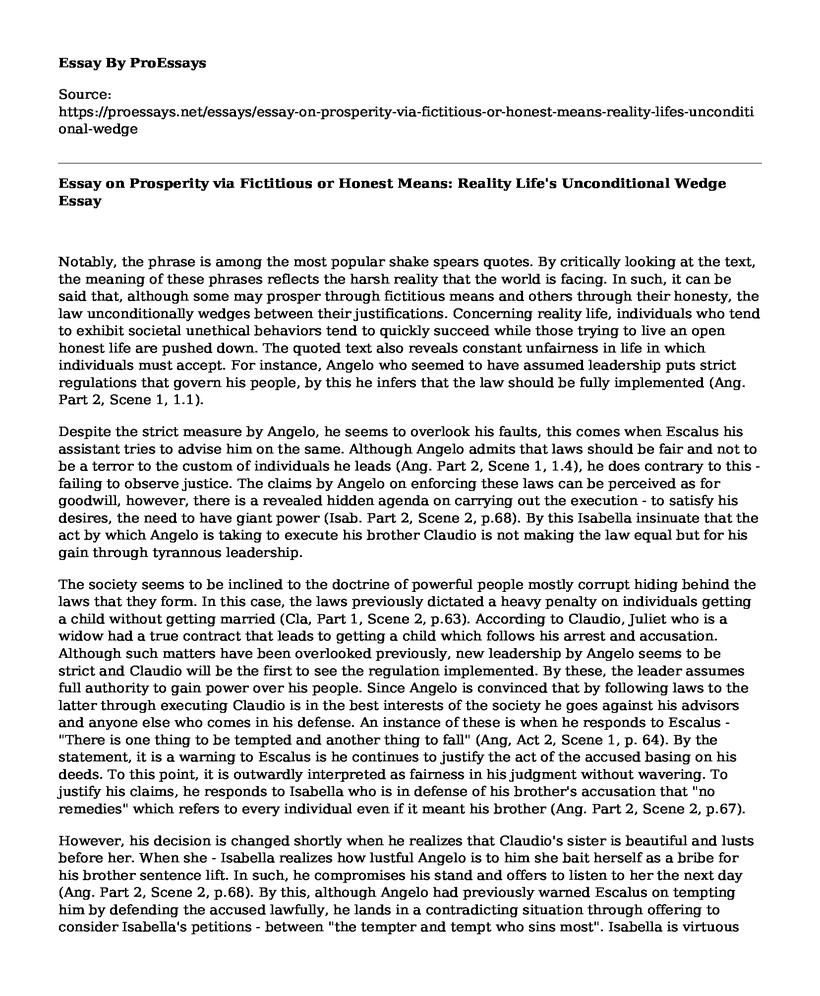Notably, the phrase is among the most popular shake spears quotes. By critically looking at the text, the meaning of these phrases reflects the harsh reality that the world is facing. In such, it can be said that, although some may prosper through fictitious means and others through their honesty, the law unconditionally wedges between their justifications. Concerning reality life, individuals who tend to exhibit societal unethical behaviors tend to quickly succeed while those trying to live an open honest life are pushed down. The quoted text also reveals constant unfairness in life in which individuals must accept. For instance, Angelo who seemed to have assumed leadership puts strict regulations that govern his people, by this he infers that the law should be fully implemented (Ang. Part 2, Scene 1, 1.1).
Despite the strict measure by Angelo, he seems to overlook his faults, this comes when Escalus his assistant tries to advise him on the same. Although Angelo admits that laws should be fair and not to be a terror to the custom of individuals he leads (Ang. Part 2, Scene 1, 1.4), he does contrary to this - failing to observe justice. The claims by Angelo on enforcing these laws can be perceived as for goodwill, however, there is a revealed hidden agenda on carrying out the execution - to satisfy his desires, the need to have giant power (Isab. Part 2, Scene 2, p.68). By this Isabella insinuate that the act by which Angelo is taking to execute his brother Claudio is not making the law equal but for his gain through tyrannous leadership.
The society seems to be inclined to the doctrine of powerful people mostly corrupt hiding behind the laws that they form. In this case, the laws previously dictated a heavy penalty on individuals getting a child without getting married (Cla, Part 1, Scene 2, p.63). According to Claudio, Juliet who is a widow had a true contract that leads to getting a child which follows his arrest and accusation. Although such matters have been overlooked previously, new leadership by Angelo seems to be strict and Claudio will be the first to see the regulation implemented. By these, the leader assumes full authority to gain power over his people. Since Angelo is convinced that by following laws to the latter through executing Claudio is in the best interests of the society he goes against his advisors and anyone else who comes in his defense. An instance of these is when he responds to Escalus - "There is one thing to be tempted and another thing to fall" (Ang, Act 2, Scene 1, p. 64). By the statement, it is a warning to Escalus is he continues to justify the act of the accused basing on his deeds. To this point, it is outwardly interpreted as fairness in his judgment without wavering. To justify his claims, he responds to Isabella who is in defense of his brother's accusation that "no remedies" which refers to every individual even if it meant his brother (Ang. Part 2, Scene 2, p.67).
However, his decision is changed shortly when he realizes that Claudio's sister is beautiful and lusts before her. When she - Isabella realizes how lustful Angelo is to him she bait herself as a bribe for his brother sentence lift. In such, he compromises his stand and offers to listen to her the next day (Ang. Part 2, Scene 2, p.68). By this, although Angelo had previously warned Escalus on tempting him by defending the accused lawfully, he lands in a contradicting situation through offering to consider Isabella's petitions - between "the tempter and tempt who sins most". Isabella is virtuous corrupt to save the skin of his brother while Angelo's motives are behind his satisfaction of pleasure. By this, the laws which should wedge between fair justifications are disregarded to meet the self-interest of the parties. The course taken by this leader in regulating although are societally interpreted as real but truth is that they are not- to fulfil the urge to take full control over the people.
Conclusion
Considering the case and argument between Angelo and Isabella, whether through honesty or ill intent, both of the express self-gratification disregarding the welfare of others. Because, the laws are meant to provide a guideline through which individuals should lead, vices and virtues are critical. However, although Isabella justifies her action with honesty, her intension was to save her brother, similarly, although Angelo seems convinced with meeting her, her intension is not to be lenient on his stand but to satisfy his desires. By this, the phrase "Some Rise by Sin, Some by Virtue Fall" is in fulfillment. There is unfairness in life and all individuals have to accept - for instance, he agrees that the one tempted is sinned than one tempting.
Work cited
Shakespeare, W. (1985). Mr. William Shakespeares Comedies, Histories & Tragedies: Published According to the True Originall Copies. E. & J. Wright. Accessed from https://firstfolio.bodleian.ox.ac.uk/download/text-pdfs/F-mm.pdf
Cite this page
Essay on Prosperity via Fictitious or Honest Means: Reality Life's Unconditional Wedge. (2023, Jul 24). Retrieved from https://proessays.net/essays/essay-on-prosperity-via-fictitious-or-honest-means-reality-lifes-unconditional-wedge
If you are the original author of this essay and no longer wish to have it published on the ProEssays website, please click below to request its removal:
- Driven Decision-Making (DDDM) Model Paper Example
- Position Leadership Succession Planning Report
- 69yo Male pt: Suicidal, Insomnia, Anxiety, Headaches, Fatigue, Worthlessness - Essay Sample
- Leadership: Jack Ma Model of Ethical Leadership - Essay Sample
- Essay Example on Maximizing Team Performance in Retail: Analyzing Essential Factors
- Free Essay Example on Thorndike's Law of Effect: Stimuli-Response & Reinforcement
- Reprogram My Preferences - Essay Sample







